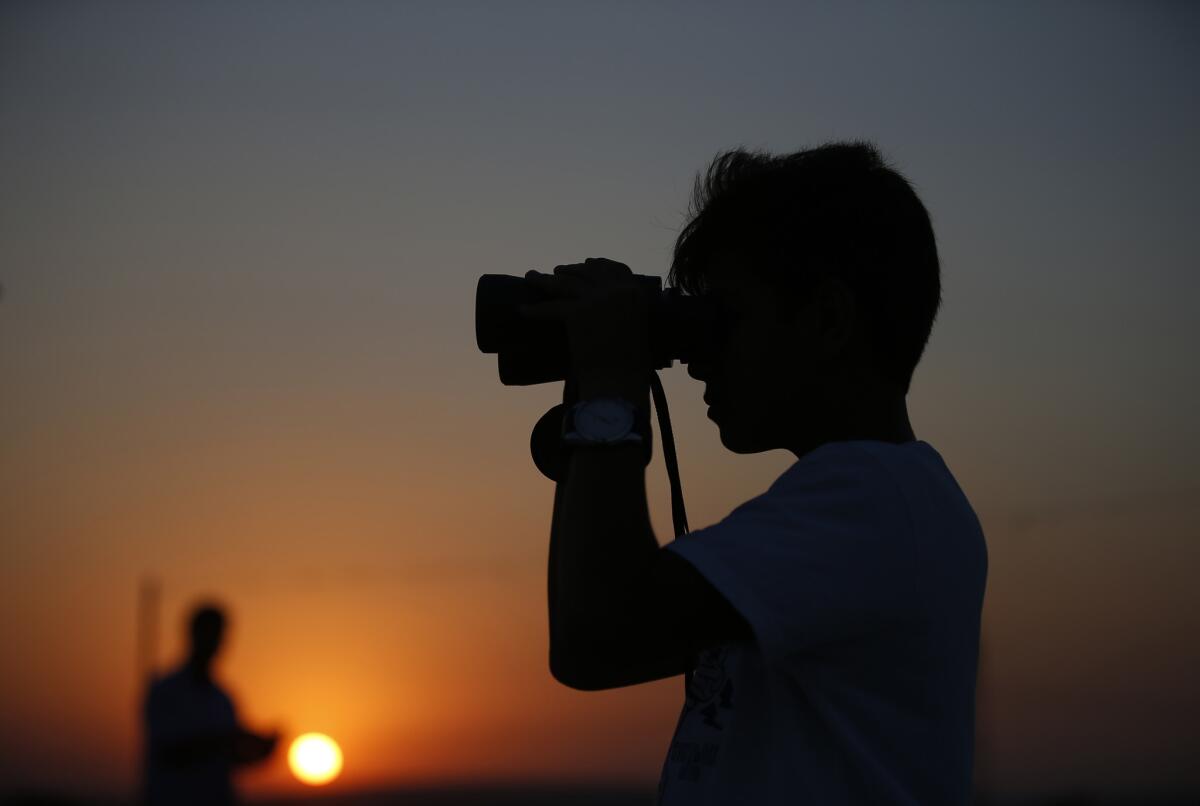Violence heating up along Turkey-Syria border

A young man looks at Turkish army tanks holding positions near the border with Syria in the outskirts of the village of Elbeyli, east of the town of Kilis, on July 23.
- Share via
Reporting from Beirut — Clashes between Islamic State militants and Turkish forces on Thursday resulted in the deaths of a Turkish soldier and a Syrian militant, Turkish officials said, in the latest outbreak of violence along the volatile border between Syria and Turkey.
Gunfire across the border from Syria killed a Turkish noncommissioned officer and wounded two sergeants in the village of Elbeyli, east of the Turkish border town of Kilis, according to Turkey’s official Anadolu news agency. Five militants “opened fire from a Daesh-controlled Syrian border region,” Anadolu reported, using an Arab acronym for Islamic State.
The shots came from near the Syrian village of Al-Raaee in Aleppo province, reported a pro-opposition watchdog group, the Syrian Observatory for Human Rights.
Turkish units returned fire, killing one militant and heavily damaging three pickup trucks, Anadolu reported, adding that the army had bolstered its presence on the border with armored units and had scrambled F-16 fighter jets.
Activists on social media uploaded images of what was purported to be the dead militant as well as some of the weapons left behind by extremist fighters. Opposition activists in Syria reported Islamic State had also dispatched reinforcements to the border.
The skirmish comes in the midst of rising demands from inside Turkey — especially from the nation’s Kurdish minority — that Ankara do more to prevent the passage of militants between Turkey and Syria. The Turkish government has vehemently denied allegations that it has aided Islamic State and other militant factions fighting to oust the Syrian government of President Bashar Assad. But the great majority of the thousands of foreign extremists who have joined militant factions in Syria arrived via Turkey.
The major Kurdish militia in Syria is a largely secular group that is a direct adversary of Islamic State, an Al Qaeda breakaway faction.
On Monday, a suicide bomber targeted a pro-Kurdish gathering in the Turkish border town of Suruc, about six miles north of the largely Kurdish Syrian border city of Kobani. Turkish officials blamed Islamic State for the attack, which left 32 activists dead and more than 100 wounded.
The targeted activists had planned to cross into Syria and help in reconstruction efforts in Kobani. The town was devastated after months-long clashes between Islamic State militants and Kurdish militiamen backed by U.S. airstrikes. The Kurds ultimately repelled the Islamic State attack.
The Suruc bombing prompted a series of demonstrations across Turkey. Protesters condemned the attack and many assailed what they alleged was the Turkish government’s collaboration with Islamic extremists fighting in Syria.
Two days after the Suruc bombing, Kurdish militants in Turkey were accused of killing two policemen in an apparent revenge attack for the bombing in Suruc. On Thursday, Anadolu reported, one police officer was killed and one wounded in an attack in the southeastern city of Diyarbakir.
Turkey has long turned a blind eye to movements across the border by Syrian rebels and sympathizers. Towns and cities on the Turkish side of the more-than-500-mile border with Syria have become rear guard supply bases, logistics hubs and medical treatment centers for various Syrian opposition groups, including Islamic State.
Some Kurds and others have accused Ankara of providing direct support to Islamic State and allowing the extremists to infiltrate Kurdish-controlled areas of northern Syria to fight against Kurdish militiamen. Ankara vehemently denies the charge.
But Turkish officials are extremely wary of ethnic Kurdish factions that have carved out semiautonomous areas in northern Syria along the Turkish border. Ankara views the major Syrian Kurdish militia as a proxy for the Kurdistan Workers Party, which has been locked in a more than 30-year insurgent war with Turkey.
Turkey says it has been stepping up security measures along the border and heightening screening designed to stop would-be militants traveling from Turkey to join extremists groups in Syria. Turkey says it has also fortified the border area with additional ditches, fences, lighting, walls and patrol roads, while deploying additional troops and police in the border region.
Bulos is a special correspondent.
More to Read
Sign up for Essential California
The most important California stories and recommendations in your inbox every morning.
You may occasionally receive promotional content from the Los Angeles Times.












